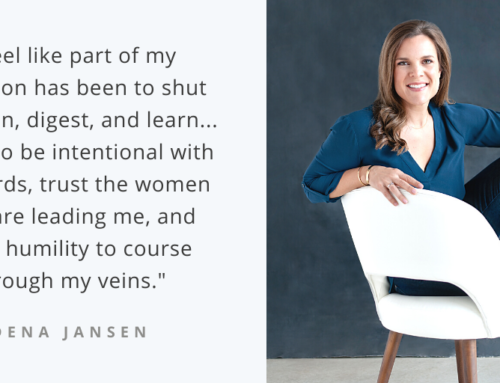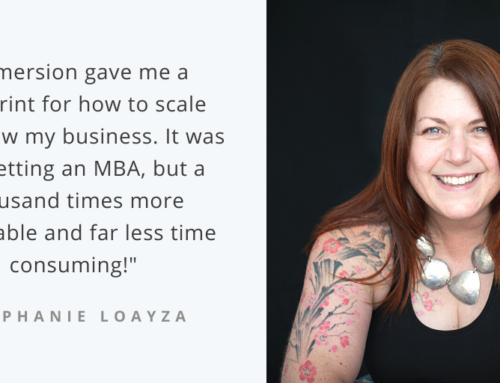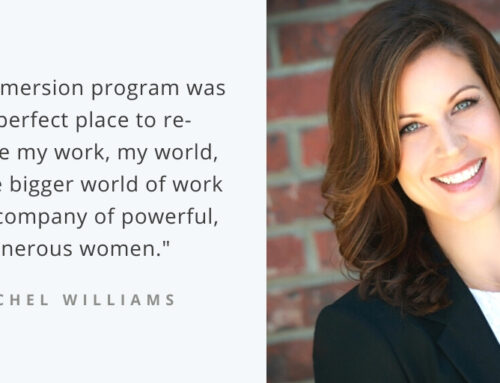
By Emily Soccorsy
Ellivate Alliance Dream Team Member
Co-founder, Root + River
Defier. Woman. Mother.
I still think about that day at least once a month.
It was probably 15 years ago.
I was a young leader, an editor and manager, in a newspaper company. I was attending an editors’ meeting that had been carefully crafted by my mentor and boss. He had designed the day around sharing best practices, learning from one another and looking at different ways of improving our work. It was a wonderful moment for me to engage in this way, to show off my intelligence, my organization, and to learn from the other editors who had more and different experience than I. I was loving it.
For the last exercise of the day, my boss asked a simple question and invited us to go around the table one-by-one, sharing our answers.
I was the last one to speak, which I was exceedingly grateful for because, once he had asked the question, everything inside of me stopped. I was horrified, numb and my mind became a vast tundra of nothingness.
The question was, “What is something you are doing for yourself?”
I had no idea how to answer. As a young mother, as a leader and editor, as a wife, as a daughter, a sister, a person, what I was doing then was giving, giving, giving. My father-in-law was dying of an incurable and untreatable disease, my husband was playing the role of patriarch and caretaker, and I was swimming as hard as I could to keep up with bills, with my work, with taking care of our daughter.
As I frantically repeated the question to myself, I realized I could not answer, because I had nothing to add, nothing to say.
Then the worst thing happened.
It was my turn. I opened my mouth to speak, and instead I collapsed into uncontrollable sobs that I could not reign in. I had to get up and leave the room, disgraced, ashamed and still sobbing.
At the time, I truly believed this was the most awful event that could happen to me in a work setting.
I had toiled so very hard to convince my colleagues, my boss, my team that I was what I thought every leader was supposed to be – even-keeled, rational, logical, not overly emotional. And in a moment, I had completely destroyed the image I had been working so hard to project. They had all seen the ugly truth I was trying to hide – that I was deeply emotional, and that sometimes my emotion overtook me.
I had been taught the ocean of emotion and empathy inside of me, which is part of my most inherent being, was something to keep under wraps. That it was a weakness; that people – especially men – would see it as a sign of instability, vulnerability and inability.
So it was tucked away, hidden.
After that day, I spent years still stuck in the mindset I had failed in that moment. I was committed to the idea that my emotion was a negative attribute that could disrupt my ability to lead, to achieve, to succeed.
I wish I could pinpoint the moment when I beat that notion for good, but I can’t.
Maybe because of grace, maybe because of openness of heart and mind, likely because of role models, and coaches and therapists and mentors, and my own insistence that something was off – I realized that being an emotional person, being in tune with how I felt was a big, powerful ability.
Emotion gives us so much!
A person who is emotionally in touch knows how to handle the human sitting in front of them they are about to fire.
A person who is emotionally in touch can finesse an acquaintance into a fully reciprocal relationship that results in things like: lasting love and commitment, a healthy, happy family, or a years-long business client or strategic partnership.
A person who is emotionally in touch can speak to their audience with sincerity and honesty, which will, in turn, grow their business.
A person who is emotionally in touch is better equipped to listen and hear their clients, read market trends, and sense how people feel about the options placed before them. This makes them better salespeople, superior marketers, excellent at customer care.
A person who is emotionally in touch with themselves can reach out and connect with their team in a way that makes each person on the team feel seen, appreciated, invested in and loved. That results in more work, better results and prosperity for the company, and the team.

I could go on and on with the positive implications of being an emotional person and of showing your emotion in your work.
Here’s the point: despite what 19th and 20th century business philosophy has taught us, being a leader does not require the absence of emotion.
Instead, being a 21st century leader demands the presence of emotion.
To make a broad (and I believe true) statement, as women, we are more in touch with our emotions and with relationships. We tend to have the hardwiring for it, as well as the social conditioning toward it. Our innate emotional intelligence gives us a significant advantage in our work.
Developing that emotional intelligence is a key part of our ability to grow as leaders, which I why I am so passionate about Ellivate Alliance. Ellivate creates a place where women can grow their emotional intelligence, be emotional, while also being driven entrepreneurs, business bad-asses and consummate professionals. Within the loving embrace of Ellivate, women get to be both emotional and rational, spiritual and analytical.
The idea that leaders must be unemotional, that emotion equals weakness is sunsetting.
Yet, it is incumbent upon us to help that day along. We must connect and collaborate with one another in a way that supports our emotional lives. Together, we must show the state of our feelings at work. We must be open and honest about being emotional. We must confidently connect the dots for others. We must clearly share that our emotion is part of the reason why we are so very good at what we do.
In doing so, we will remove the negative stigma around “emotional women and men” – and reveal the truth: that our emotion is our humanity.





